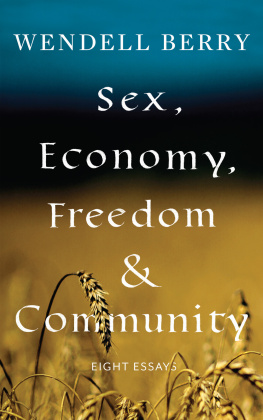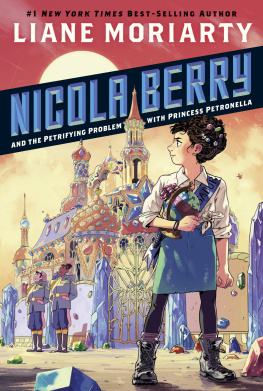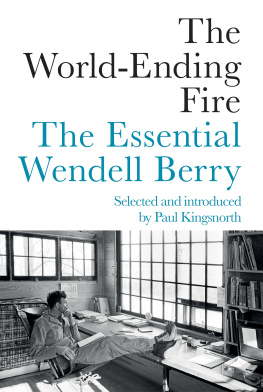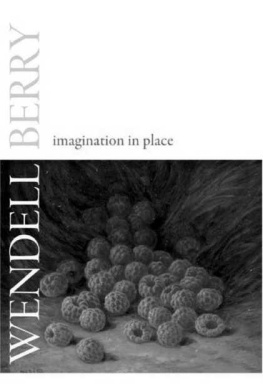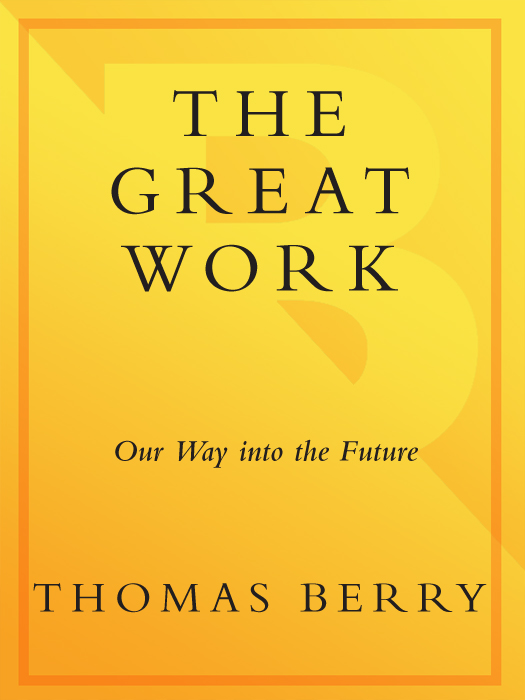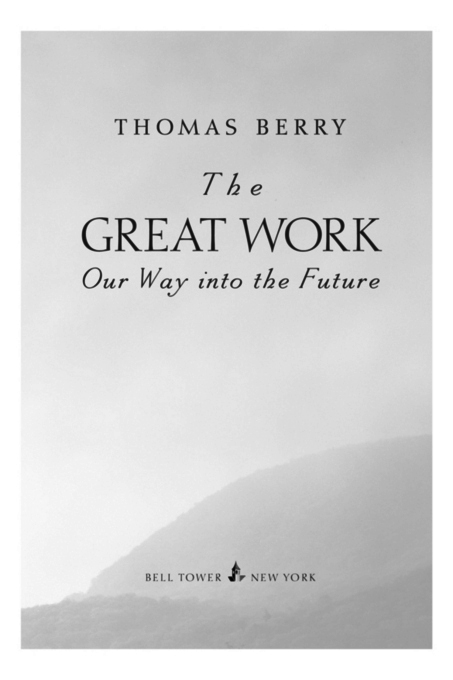Maybe once every 100 years does someone emerge from the shuddering mass of humanity who speaks to us with a kind of clarity that is universally profound. Thomas Berry is such a figure. The Great Work will, I believe, be remembered as the touchstone, the bible whose wisdom laid the groundwork for our continued healthy existence here on Earth.
Thomas Rain Crowe, The Bloomsbury Review
Thomas Berry has demonstrated once again that he is one of the few great religious minds to be reckoned with.
Wes Jackson, president of the Land Institute
Great Work indeed! Thomas Berry offers us the benefit of a lifetime of clear-headed, clear-hearted reflection. And by so doing he shows us where our task lies, shows us the particular test that we must face just as our ancestors faced their own great challenges. Its a work to stir the blood.
Bill McKibben, author of The End of Nature
Thomas Berry is the bard of the new cosmology. He unerringly finds the mythic dimension and the moral significance behind the scientific facts.
Theodore Roszak, author of The Voice of the Earth and Ecopsychology
How different American society might be if every high school student were exposed to the ideas contained in this book. One can only sigh in gratitude for this comprehensive and cautionary cultural history, and raise a cheer for those members of the human community already engaged in the truly Great Work.
Virginia Baron, Parabola
Also by Thomas Berry
The Historical Theory of Giambattista Vico
Buddhism
The Religions of India
The Dream of the Earth
Befriending the Earth (with Thomas Clarke)
The Universe Story (with Brian Swimme)
Some of the material in this book previously appeared in a different form.
Copyright 1999 by Thomas Berry
Photograph on title page spread copyright 1999 by Carr Clifton
All rights reserved. No part of this book may be reproduced or transmitted in any form or by any means, electronic or mechanical, including photocopying, recording, or by any information storage and retrieval system, without permission in writing from the publisher.
Published by Bell Tower, New York, New York
Member of the Crown Publishing Group.
Originally published in hardcover by Bell Tower in 1999.
Random House, Inc. New York, Toronto, London, Sydney, Auckland
www.randomhouse.com
Bell Tower and colophon are registered trademarks of Random House, Inc.
Library of Congress Cataloging-in-Publication Data
Berry, Thomas Mary, 1914
The great work : our way into the future / Thomas Berry. 1st ed.
p. cm.
1. Deep ecologyPhilosophy. 2. Human ecologyPhilosophy.
I. Title.
GE195.B47 1999
304.2dc21 99-26350
eISBN: 978-0-307-43419-7
v3.1
To the children
To all the children
To the children who swim beneath
The waves of the sea, to those who live in
The soils of the Earth, to the children of the flowers
In the meadows and the trees in the forest, to
All those children who roam over the land
And the winged ones who fly with the winds,
To the human children too, that all the children
May go together into the future in the full
Diversity of their regional communities.
TO ALL THOSE WHO
HAVE ASSISTED ME THROUGH
THESE MANY YEARS ,
I AM GRATEFUL .
Contents
Introduction
HUMAN PRESENCE ON THE PLANET EARTH IN THE OPENING years of the twenty-first century is the subject of this book. We need to understand where we are and how we got here. Once we are clear on these issues we can move forward with our historical destiny, to create a mutually enhancing mode of human dwelling on the planet Earth.
Just now we seem to be expecting some wonderworld to be attained through an ever-greater dedication to our sciences, technologies, and commercial projects. In the process, however, we are causing immense ruin in the world around us.
We might begin to think about our present life-situation by reflecting for a moment on the wonder of Earth, how it came to be the garden planet of the universe and what might be our human role in this context. To appreciate our immediate situation we might also develop a new intimacy with the North American continent. For we need the guidance and support of this continent as we find our way into the future.
The most basic and most disturbing commitment of the original European settlers was to conquer this continent and reduce it to human use. Because the exaltation of the human and the subjugation of the natural have been so excessive, we need to understand how the human community and the living forms of Earth might now become a life-giving presence to each other. We have already shaped the critical understanding and the appropriate technologies that can assist in establishing a beneficial human presence with the other components of this continent and also with the one great Earth community. We need only see that our human technologies are coherent with the ever-renewing technologies of the planet itself.
An indispensable resource in fulfillment of this task is the guidance of the indigenous peoples of this continent, for they have understood, better than we have understood, the integral relation of humans with this continent and with the entire natural world. In an earlier period we have been profoundly concerned with divine-human relations. In more recent centuries we have been concerned with interhuman relations. Our future destiny rests even more decisively on our capacity for intimacy in our human-Earth relations.
Of the institutions that should be guiding us into a viable future, the university has a special place because it teaches all those professions that control the human endeavor. In recent centuries the universities have supported an exploitation of the Earth by their teaching in the various professions, in the sciences, in engineering, law, education, and economics. Only in literature, poetry, music, art, and occasionally in religion and the biological sciences, has the natural world received the care that it deserves.
Our educational institutions need to see their purpose not as training personnel for exploiting the Earth but as guiding students toward an intimate relationship with the Earth. For it is the planet itself that brings us into being, sustains us in life, and delights us with its wonders. In this context we might consider the intellectual, political, and economic orientations that will enable us to fulfill the historical assignment before usto establish a more viable way into the future.
As in creating some significant work the artist first experiences something akin to dream awareness that becomes clarified in the creative process itself, so we must first have a vision of the future sufficiently entrancing that it will sustain us in the transformation of the human project that is now in process. Such an entrancing vision we propose here as the Ecozoic Era, the period when humans would become a mutually beneficial presence on the Earth.
That future can exist only when we understand the universe as composed of subjects to be communed with, not as objects to be exploited. Use as our primary relationship with the planet must be abandoned. While there are critical issues in providing food, shelter, and livelihood to vast numbers of peoples, these issues themselves ultimately depend on our capacity to sustain the natural world so that the natural world can sustain us. All our sciences and technologies and all our social institutions become dysfunctional if the natural life systems cease to function.


